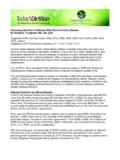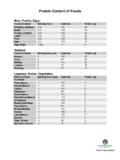Transcription of Suggested CDR Learning Codes: 3000, 3020, 3090, …
1 Thyroid Disease and Diet Nutrition Plays a Part in maintaining Thyroid health By Cheryl Harris, MPH, RD Suggested CDR Learning Codes: 3000 , 3020, 3090, 4000, 4040, 4050, 5000, 5110, 5120, 5160, 5190, 5290; Level 2 I have a tough time losing weight because of my thyroid. You ve probably heard this complaint time and again from clients who have thyroid disease and with good reason. To the great frustration of many of the 27 million Americans with thyroid gland issues, the thyroid has a profound impact on metabolism. Unintended weight gain and weight loss are common, and both can be a daunting challenge to rectify. Although weight may be the most common complaint, clients are at an increased risk of cardiovascular disease and diabetes, underscoring the need to eat a balanced diet and adopt a healthful lifestyle. But since one-half of all people with thyroid disease are undiagnosed and weight changes are a common symptom,1 RDs are in a prime position to spot potential thyroid conditions, make appropriate referrals, and help clients get a timely diagnosis and the treatment they need.
2 This continuing education activity will provide an overview of thyroid disease, its relationship with cardiovascular disease and diabetes, and the role nutrition plays in maintaining thyroid health . Thyroid 101 The thyroid gland is a 2-inch butterfly-shaped organ located at the front of the neck. Though the thyroid is small, it s a major gland in the endocrine system and affects nearly every organ in the body. It regulates fat and carbohydrate metabolism, respiration, body temperature, brain development, cholesterol levels, the heart and nervous system, blood calcium levels, menstrual cycles, skin integrity, and The most common thyroid condition is hypothyroidism, or underactive thyroid. In the United States, hypothyroidism usually is caused by an autoimmune response known as Hashimoto s disease or autoimmune thyroiditis. As with all autoimmune diseases, the body mistakenly identifies its own tissues as an invader and attacks them until the organ is destroyed.
3 This chronic attack eventually prevents the thyroid from releasing adequate levels of the hormones T3 and T4, which are necessary to keep the body functioning properly. The lack of these hormones can slow down metabolism and cause weight gain, fatigue, dry skin and hair, and difficulty concentrating (see table below).2 Hashimoto s affects approximately 5% of the US population, is seven times more prevalent in women than men, and generally occurs during middle Hyperthyroidism, or overactive thyroid gland, is another common thyroid condition. The most prevalent form is Graves disease in which the body s autoimmune response causes the thyroid gland to produce too much T3 and T4. Symptoms of hyperthyroidism can include weight loss, high blood pressure, diarrhea, and a rapid heartbeat. Graves disease also disproportionately affects women and typically presents before the age of Hashimoto s is more common than Graves disease, but both are referred to as autoimmune thyroid disease (ATD), which has a strong genetic link and is associated with other autoimmune disorders, such as type 1 diabetes, rheumatoid arthritis, lupus, and celiac A goiter, or enlargement of the thyroid gland, can be caused by hypothyroidism, hyperthyroidism, excessive or inadequate intake of iodine in the diet, or thyroid cancer the most common endocrine cancer whose incidence studies indicate is Treatment The disease process for Hashimoto s is a spectrum, and not all patients require treatment.
4 Some patients have autoimmune antibodies but retain enough thyroid function without the need for intervention for years. Generally, once the body can no longer produce an adequate amount of thyroid hormone for necessary physiological functions, thyroid replacement medication is necessary to correct the hormonal imbalances associated with hypothyroidism. Hyperthyroidism usually is treated with medications, surgery, or oral radioactive iodine. However, these treatments are imprecise and may cause the thyroid to secrete inadequate amounts of T3 and T4 and function insufficiently after treatment. Seventy percent to 90% of patients with Graves or thyroid cancer eventually need treatment for hypothyroidism as a result of Cardiovascular Risk and Diabetes Patients with hypothyroidism have a greater risk of cardiovascular disease than the risks associated with weight gain alone. Low levels of thyroid hormones lead to a higher blood lipid profile, increased blood pressure, and elevated levels of the amino acid homocysteine and the inflammatory marker C-reactive Thyroid hormones regulate cholesterol synthesis, cholesterol receptors, and the rate of cholesterol degradation.
5 Hypothyroidism increases LDL levels, and increased cholesterol levels have been shown to induce hypothyroidism, leading to a harmful feedback loop that has been illustrated most clearly in animal models. In humans, normalization of thyroid hormone levels has a beneficial effect on cholesterol, which may be worth noting especially for clients who choose not to take prescribed thyroid Moreover, a strong relationship exists between thyroid disorders, impaired glucose control, and diabetes. Thirty percent of people with type 1 diabetes have ATD, and of those with type 2 diabetes have thyroid disease compared with a prevalence of thyroid disease in the general public. Both hypothyroidism and hyperthyroidism affect carbohydrate metabolism and have a profound effect on glucose control, making close coordination with an endocrinologist Weight It s imperative dietitians have a good understanding of the metabolic changes associated with thyroid disease so they can set realistic goals and expectations for clients.
6 Most people with hypothyroidism tend to experience abnormal weight gain and difficulty losing weight until hormone levels stabilize. Moreover, it s common for patients with Graves disease to experience periods of high and low thyroid hormone levels, so it may take several months to achieve a balance. During this time, it s essential clients focus on healthful behaviors such as eating nutritious foods, exercising regularly, managing stress, and sleeping adequately rather than focus on the numbers on the scale. Clara Schneider, MS, RD, RN, CDE, LDN, of Outer Banks Nutrition and author of numerous books, including The Everything Thyroid Diet Book, says, The No. 1 priority is to get the thyroid disease under control. Clients need to have labs and medications addressed first. Weight changes are just not going to happen before all of that is under control. She notes that Hashimoto s typically occurs around menopause, which compounds the weight gain issue that many women experience during that time.
7 The biggest factors that help with weight loss are calorie- and carbohydrate-controlled meal plans, says Sheila Dean, DSc, RD, LD, CCN, CDE, of the Palm Harbor Center for health & Healing in Florida. Naturally I try to ensure [clients are] eating a whole foods-based, minimally processed diet with at least 2 L of water daily. Schneider agrees that a heart-healthy eating plan is fundamental. The diet should emphasize more vegetables, leaner meats, more beans, fiber, and fluids. We need to look at intake of sugars, added fats, fast food, and meals out. Emphasizing lean proteins, vegetables, fruits, heart-healthy fats and omega 3s, high-fiber foods, and appropriate portions can help manage or prevent illnesses associated with thyroid disease. As Schneider notes, It s eating for prevention of all these diseases that accompany thyroid disease: heart disease, diabetes, cancer, and more. As an added bonus, fiber can relieve constipation that people with hypothyroidism often experience.
8 Key Nutrients Many nutritional factors play a role in optimizing thyroid function. However, both nutrient deficiencies and excesses can trigger or exacerbate symptoms. Working in collaboration with a physician is ideal to determine nutritional status for optimal thyroid health . Iodine: Iodine is a vital nutrient in the body and essential to thyroid function; thyroid hormones are comprised of iodine. While autoimmune disease is the primary cause of thyroid dysfunction in the United States, iodine deficiency is the main cause Iodine deficiency has been considered rare in the United States since the 1920s, largely due to the widespread use of iodized salt. This, along with fish, dairy, and grains, is a major source of iodine in the standard American diet. However, iodine intake has dropped during the past few decades. Americans get approximately 70% of their salt intake from processed foods that, in the United States and Canada, generally don t contain iodine.
9 A 2012 Centers for Disease Control and Prevention report indicates that, on average, Americans are getting adequate amounts of iodine, with the potential exception of women of childbearing age10 (see Thyroid Disease and Pregnancy sidebar below). Both iodine deficiency and excess have significant risks; therefore, supplementation should be approached with caution. Supplemental iodine may cause symptom flare-ups in people with Hashimoto s disease because it stimulates autoimmune Iodine intake often isn t readily apparent on a dietary recall since the amount in foods is largely dependent on levels in the soil and added salt. However, Schneider says, Clients taking iodine tablets are a red flag. Frequent intake of foods such as seaweed, which is high in iodine, or an avoidance of all iodized salt may serve as signs that further exploration is needed. Vitamin D: Vitamin D deficiency is linked to Hashimoto s, according to one study showing that more than 90% of patients studied were deficient.
10 However, it s unclear whether the low vitamin D levels were the direct cause of Hashimoto s or the result of the disease process Hyperthyroidism, particularly Graves disease, is known to cause bone loss, which is compounded by the vitamin D deficiency commonly found in people with hyperthyroidism. This bone mass can be regained with treatment for hyperthyroidism, and experts suggest that adequate bone-building nutrients, such as vitamin D, are particularly important during and after Foods that contain some vitamin D include fatty fish, milk, dairy, eggs, and mushrooms. Sunlight also is a potential source, but the amount of vitamin production depends on the season and latitude. If clients have low vitamin D levels, supplemental D3 may be necessary, and the client s physician should monitor progress to ensure the individual s levels stay within an appropriate range. Selenium: The highest concentration of selenium is found in the thyroid gland, and it s been shown to be a necessary component of enzymes integral to thyroid Selenium is an essential trace mineral and has been shown to have a profound effect on the immune system, cognitive function, fertility in both men and women, and mortality rate.










